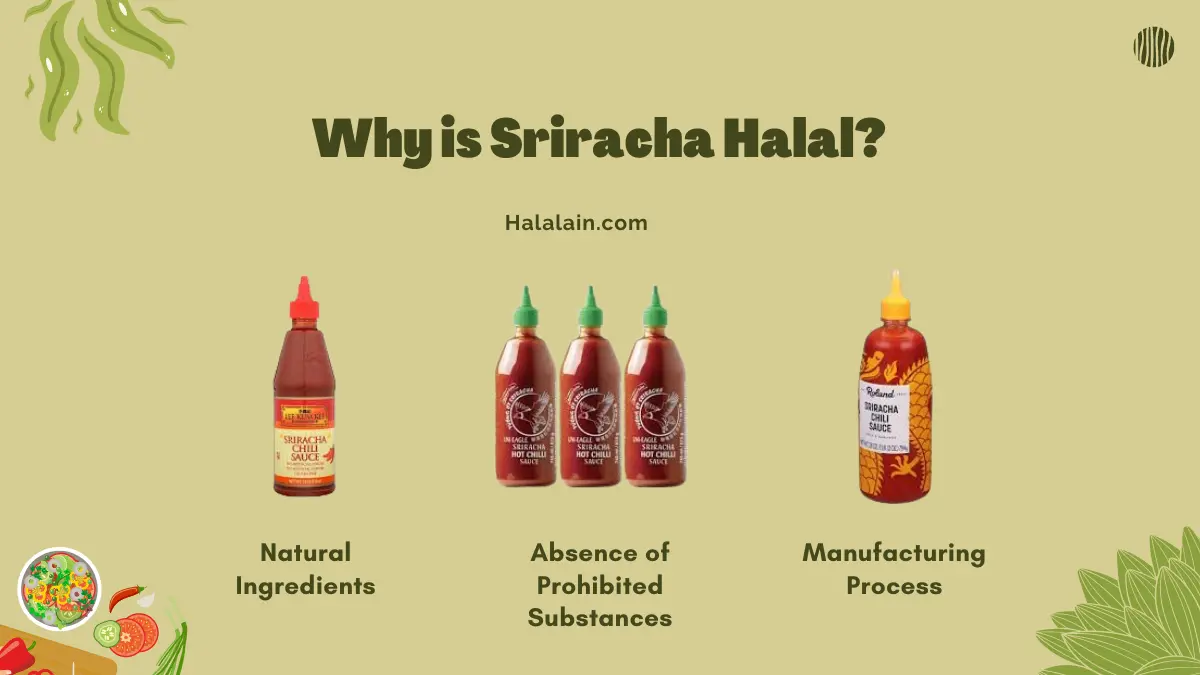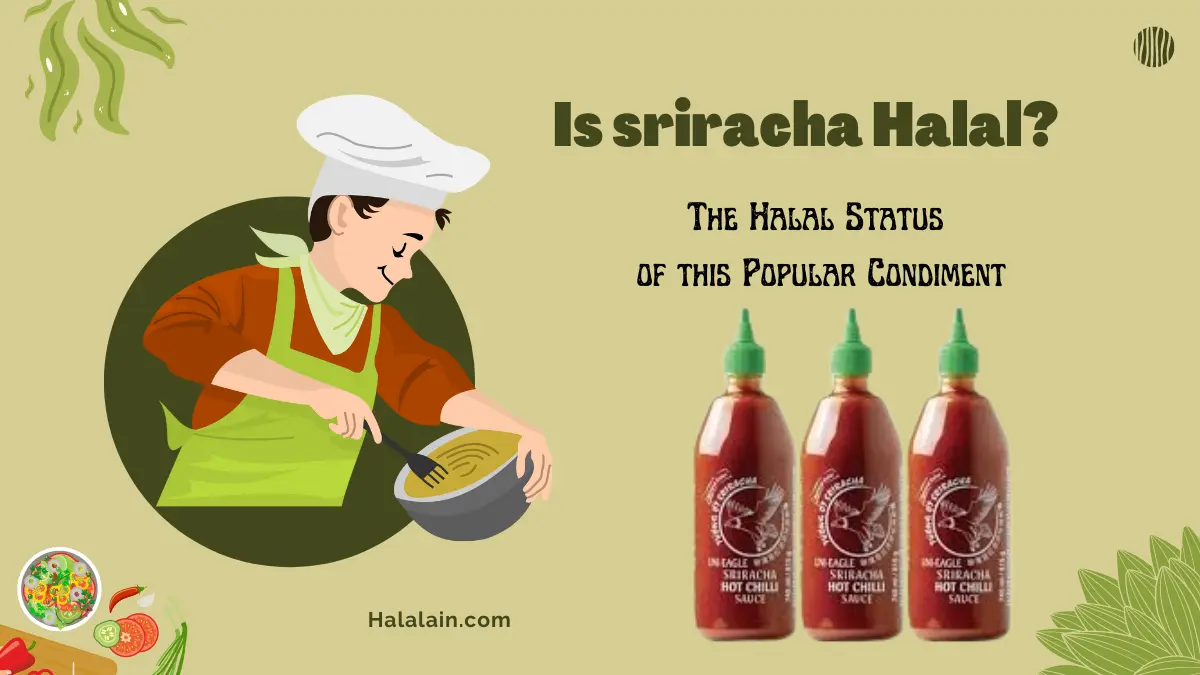Sriracha sauce has earned its place as a beloved condiment in kitchens around the world. Known for its distinctive spicy kick and versatility, this iconic sauce finds its way into a variety of cuisines, from Asian to Western dishes. However, for those adhering to halal dietary guidelines, the question arises: Is Sriracha halal?
Introduction to sriracha halal
Sriracha sauce, with its fiery flavour and widespread popularity, has become a staple condiment in kitchens worldwide. Whether drizzled on noodles, slathered on sandwiches, or used as a dipping sauce, its versatility knows no bounds.
However, for adherents of halal dietary guidelines, ensuring the conformity of Sriracha sauce with their religious principles becomes a pertinent consideration.
Halal, derived from Arabic, translates to permissible. It encompasses a set of dietary laws outlined in Islamic scriptures, including the Quran and Hadith, dictating what is lawful for consumption.
For Muslims, adherence to halal principles extends beyond mere sustenance; it reflects a profound commitment to religious beliefs and values.
In this exploration, we delve into the halal status of Sriracha sauce, dissecting its ingredients, manufacturing processes, and certification practices.
By understanding these aspects, we aim to provide clarity for Muslim consumers seeking to incorporate this beloved condiment into their culinary repertoire while upholding their halal dietary standards. Let’s embark on a journey to unravel the complexities and nuances of Sriracha’s halal status.
Short answer
Yes, Sriracha sauce is halal. Its halal status is primarily attributed to the natural ingredients that are commonly used in its preparation, such as pepper, vinegar, garlic, sugar and salt.
These ingredients contain no substances prohibited in Islam, ensuring that the sauce complies with Islamic dietary guidelines.
The production process involved in producing Sriracha sauce does not involve the use of halal substances or cross-contamination with prohibited ingredients.
While specific practices may vary between brands, traditional cooking methods and blending natural ingredients contribute to maintaining the sauce’s halal status.
Some sriracha brands may go through a halal certification process to provide more assurance to Muslim consumers.
Halal certification involves thorough inspection and verification of ingredients, production facilities and processes to ensure compliance with Halal standards. Brands that carry the Halal certification label provide Muslim consumers with peace of mind about the Halal status of their products.
Why is Sriracha Halal?

Sriracha sauce is considered halal primarily because its ingredients typically meet the dietary requirements outlined in Islamic law. Here are several reasons why Sriracha is generally regarded as halal:
- Natural Ingredients: Sriracha sauce is typically made from natural ingredients such as chilli peppers, vinegar, garlic, sugar, and salt. These ingredients are halal according to Islamic dietary laws.
- Absence of Prohibited Substances: Sriracha sauce does not contain any ingredients that are explicitly prohibited in Islam, such as pork or alcohol. This absence of prohibited substances ensures its compliance with halal standards.
- Manufacturing Process: While specific manufacturing processes may vary between brands, the traditional process of making Sriracha sauce typically involves cooking and blending natural ingredients. As long as these processes do not involve the use of non-halal substances or cross-contamination with forbidden ingredients, the resulting product remains halal.
- Halal Certification: Some Sriracha brands undergo halal certification processes to cater to the dietary preferences of Muslim consumers. Halal certification involves rigorous inspection and verification of ingredients, manufacturing practices, and facilities to ensure compliance with halal standards. Brands that carry halal certification provide additional assurance to Muslim consumers regarding the halal status of their products.
- Transparency and Consumer Awareness: Many Sriracha brands prioritize transparency regarding their ingredients and manufacturing processes, allowing consumers to make informed decisions. Muslim consumers can verify the halal status of Sriracha sauce by checking ingredient labels, researching brands, and seeking guidance from trusted halal certification organizations or religious authorities.
Overall, Sriracha sauce is considered halal because it typically consists of permissible ingredients and undergoes manufacturing processes that comply with Islamic dietary laws.
However, it’s essential for Muslim consumers to exercise diligence, verify ingredient labels, and choose products from reputable brands or those with halal certification to ensure compliance with their dietary requirements.
Deconstructing Sriracha Ingredients
To determine the halal status of Sriracha sauce, it’s essential to examine its ingredients. Typically, Sriracha comprises chili peppers, vinegar, garlic, sugar, and salt.
Individually, these components are considered halal, as they do not contain any prohibited substances. However, the halal status can be influenced by factors such as processing methods and additives.
Halal Certification and Assurance
Halal certification provides assurance to Muslim consumers that a product meets the requirements of Islamic dietary laws.
While not all Sriracha brands may carry halal certification, many mainstream options undergo rigorous certification processes to cater to diverse dietary preferences.
It’s advisable for consumers to look for trusted halal certification symbols on packaging to ensure compliance.
Evaluating Manufacturing Practices
In addition to ingredient scrutiny, understanding manufacturing practices is crucial in assessing the halal status of Sriracha sauce.
Cross-contamination with non-halal substances, use of alcohol-based flavorings or additives, and processing on shared equipment with non-halal products are factors that may impact halal compliance.
Transparency from manufacturers regarding their production processes is key for informed consumer decisions.
Navigating Consumer Choices
For Muslim consumers seeking halal Sriracha options, it’s essential to research brands known for their adherence to halal standards.
Additionally, engaging with online halal food communities and seeking recommendations from trusted sources can provide valuable insights into preferred brands and products.
Conclusion
While Sriracha sauce offers a flavorful addition to a variety of dishes, it’s important for Muslim consumers to approach its consumption with mindfulness regarding halal considerations.
By understanding the ingredients, certifications, and manufacturing practices behind Sriracha brands, individuals can make informed choices that align with their dietary preferences and religious beliefs.
In essence, while not all Sriracha sauces may carry halal certification, many options on the market are suitable for consumption within halal dietary guidelines.
By staying informed and discerning in their choices, Muslim consumers can savor the zesty goodness of Sriracha while upholding their dietary principles.

